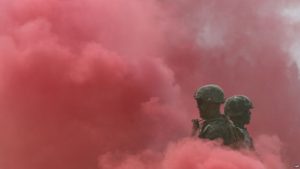
Voice of America:
In less than two months, Donald Trump will be sworn in as president of the United States, and yet he remains tight-lipped about his plans for nuclear-armed North Korea, which many believe is one of the most important security threats currently facing the United States.
While his murky North Korean policy is leaving South Korea particularly on edge, the political novice’s “America First” foreign policy proposed during his campaign is casting a shadow over military alliances and agreements between Washington and Seoul. Among the deals are how to share the financial burden of keeping American troops in the South, deployment of Terminal High Altitude Area Defense, an advanced U.S. anti-missile defense system in South Korea and the restitution of wartime operational control of South Korean forces, which has been under the U.S. Command in South Korea since the 1950-53 Korean War.
Despite the uncertainty surrounding the alliance between Washington and Seoul following Trump’s victory, former U.S. ambassadors said the longstanding U.S.-South Korea alliance will largely remain intact and smooth sailing is expected for bilateral efforts to counter growing threats posed by North Korea.
“The U.S.-ROK alliance is very firm and very resilient,” said Thomas Hubbard, former ambassador to South Korea who served from 2001 to 2004. “Our common interest will prevail regardless of who is the president of the United States.”
Strong alliance
Christopher Hill, who was the U.S. ambassador to South Korea during the George W. Bush administration, said the Trump administration will likely maintain strong military ties with Seoul given Pyongyang’s steady march toward acquiring an operational nuclear weapon.
“I don’t think they are looking to have problems in the ROK relationship,” said Hill. “If any issue emerges, I think they’ll try to work it out with the ROK and I think some of the traditional Republican security outlook toward ROK will prevail – that is, I think, they’ll try to preserve the good relationship above all else.”
